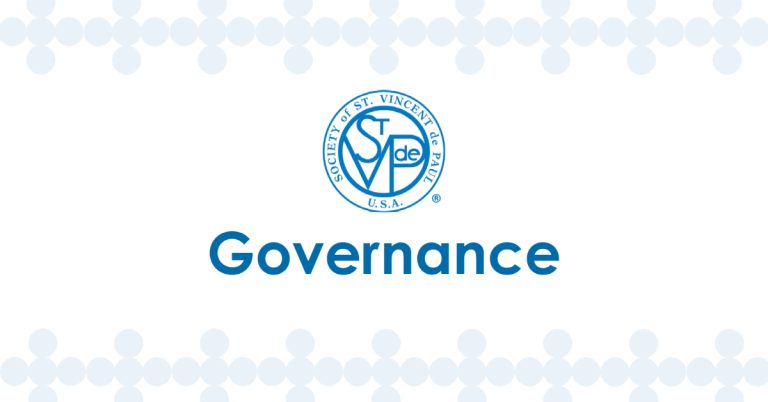Written by Tom Fahl
Before one of the workshops I presented about the Rule, I asked a few Council Executive Directors what trouble the Conferences in their respective Councils had following the Rule and what parts of the Rule generated the most questions. This article will include comments on what came back to me. While the Rule has three parts, this article will only focus on Parts I and III.
Part I of the Rule describes the Society’s philosophy and guiding principles. It is applicable to the Society throughout the world. While it’s important to review and discuss sections of Part I at Conference meetings, it’s also important to give a copy of the Rule to the clergy in your parish and to point out to them our purpose, the scope of our service, and the personal encounters we have with the poor and those in need of help. It’s also important to point out to the clergy our Vincentian Spirituality and vocation. One of the priests I heard comment on the Rule offered the opinion that no priest who understood Vincentian Spirituality would not want the Society to be in his parish. It’s up to us to take our message to the clergy.
All members of the Society should become familiar with Part I and what it says about our members, Conferences and Councils, and about our relationships with Catholic networks of charity, with the Church hierarchy, with civil society and with all groups that include charity and justice in their mission.
Part III of the Rule applies to all Councils, Conferences and members throughout this country. It is comprised of 31 Statutes.
Statutes 1 and 2 lay out our essential elements of Spirituality, Friendship and Service, and our seven Cultural Beliefs. It is important to review these with all members of the Society and then ask if your Council and Conference members embrace them. Statute 3 says the Society has two types of members – Active and Associate. It is important to understand that Associate Members are more than volunteers. Stature 4 discusses commissioning new members and the annual commitment by all members. Often the latter is on Ozanam Sunday, the last Sunday of April.
Statutes 5 through 10 discuss Conferences/Councils and their work. Statute 5 says Conferences meet at least twice a month. The frequency of our meetings helps us develop Vincentian Spirituality and foster Friendship. Statute 6 calls on Conferences to aggregate and Councils to institute. This means they are formally accepted as a part of the International Society. Statutes 7 through 10 show Conferences what a meeting agenda can include, discusses our conduct when visiting those in need, lists our festival meetings, and describes our National, (Arch)Diocesan and District Councils. It is important for every member to know that home visits are always made in pairs. And, by the way, when visiting a woman in need it is always good to have a woman as a member of the home visit team.
Statutes 11 through 21 deal with governance issues and with management. Statutes 11 and 12 refer to Servant Leaders and Servant Leader positions. Servant Leadership has been described as having the 10 following characteristics: Listening, Empathy, Healing, Awareness, Persuasion, Conceptualization, Foresight, Stewardship, Commitment to the Growth of People and Building Community. For a better insight, read an article printed in Vincentian Heritage, Vol. 9, Number 1, 1998 entitled Servant Leadership in the Manner of Saint Vincent by J. Patrick Murphy, C.M., Ph.D.
Statute 13 discusses our regions and their National Vice Presidents. Statute 14 discusses the Society’s employees. Employees can be Active Members. They can only hold office in the Society, however, after their employment by the Society is terminated. Statute 15 describes the Spiritual Advisor. This is an important position in the Society. Every Conference and every Council should have a Spiritual Advisor. The National Council has material available that will help any Conference member to be able to serve in this position.
Statute 16 discusses subsidiarity and democracy and says that decisions are often made by consensus. When a decision is not reached by consensus a matter can be put to a vote. Statute 17 discusses suspension of members, Conferences and Councils. Suspensions can only be made by our National President. An appeal of a suspension can be made to the National Conciliation Committee. Statute 21 discusses this Committee. Statutes 18 and 19 discuss the election and the removal of a President. Any President who is removed can appeal to the National Board of Directors.
Statute 20 deals with Special Works. These can remain a part of a Conference’s or Council’s normal operation or the Special Work can be incorporated. If the latter status is undertaken, the approval of Council or Conference members should be obtained and there should be consultation with the President of the next higher Council. It is important that the Bylaws of an incorporated Special Work provide that the majority of members of the Board of Directors must always be Active Members of the Society.
Statutes 22 through 31 deal with accountability. Statute 22 requires Conferences and Councils to review their services at least once every three years. This helps Conferences decide whether to keep, suspend or add a service. Statute 23 requires every Council and Conference to maintain accurate records and submit an annual report to the next higher Council annually. The National Council submits its annual report to the Council General International. Statute 24 calls on Conferences and Councils to “zealously” manage and maintain the assets of the Society and provides that the next higher Council may annually assess dues from Conferences and lower Councils. This also requires the higher Councils to work with Conferences and Councils to determine an appropriate reserve for unanticipated events.
Statute 25 discusses collections to help the poor and maintain the Society’s structure. Stature 26 makes clear that the funds of the Society are to be used only within the Society and not be diverted to any other organization, no matter how worthy they might be. Remember that people chose to give funds to the Society and not to another organization. We need to honor that intent. The Society’s Councils and Conferences have many needs although those are often in other areas. We are, however, One Society.
Statute 27 gives Council Presidents the right to require audits or audit reviews of Conferences and to have access to Conference or Council correspondence sent on behalf of the Society. Statute 28 discusses allowing members to be reimbursed for expenses they have incurred and Statute 29 provides that we not identify with any political party. No member of a political party can hold any mission of representation in the Society during his or her term in a political office. Statute 30 discusses amending any of the 31 Statutes and Statute 31 provides that our Statutes are to be interpreted according to the Rule.
Read the Rule. It’s not all that long and when followed assures that all will be well.



